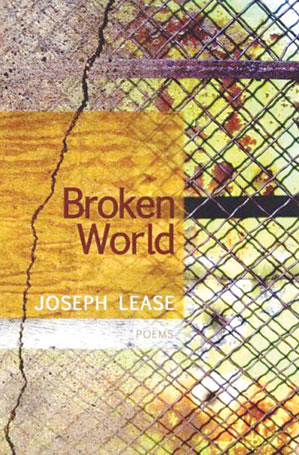One test of a book is how you feel about the writer & his or her work on completing the volume. In the case of Joseph Lease’s Broken World, I want to read everything he’s ever written, and for everything that’s written but not yet in print to get published as soon as possible. Broken World is a dazzling performance whose only weakness, to my eye & ear, is that it could have been much longer. At 66 pages, some of which have works only two lines long upon them, it’s not much larger than a chapbook. But Lease is a poet who combines the political earnestness of a George Oppen with the sound-driven poetics, say, of Robert Duncan, the richness of which really grows over time & reading. Broken World consists of two sections – one a gathering of eight relatively short poems, the other a longer work (it’s nearly half the book) in which nearly every section has the same title, “Free Again.” My sense is that, presuming that these works are representative, the ideal Lease volume would probably contain five sections on the order of these two. If it did, you’d have something on the scale – both in terms of richness & accomplishment – of
An example of how this works in practice. While the first section of this book appears to be eight individual & distinct poems, it makes use of reiteration – I’m tempted to say rhyme – in ways that may recall Jack Spicer’s use of the same poem in two places in Book of Magazine Verse at least as much as it does Laurie Anderson’s Big Science. Here, in its entirety is “Little Lightning Bolt”:
Simon says, put your hands on your head. Simon says, put your finger on your nose. Simon says, you haven’t done enough. Simon says, you don’t care enough. Simon says, compulsive old answers can’t leave the world alone. Simon says, you’re going to die. Simon says, don’t let yourself care. Simon says, you can’t stop caring. Simon says, man-tall but thin as a phone call, compulsive old answers can’t leave the world alone. Simon says, you only have blood, marsh light, and sparrow. Simon says, put your hands on your head –
And here is the second section of “Prayer, Broken Off,” three poems & eight pages later:
Simon says, put your hands on your head, Simon says, put your finger on your nose, Simon says you haven’t done enough, Simon says you don’t care enough, Simon says, you can’t stop caring –
Oh look at you – once again you’re a machine made of words, once again you’re a death, a failure, your responses always too big and dirty
and you want them to get bigger and dirtier –
And tho the Simon says trope doesn’t appear elsewhere, the tone & rhythm of these two pieces are absolutely central to the first section of this book. This is a book unashamed of its feelings, or perhaps ashamed but willing to go forward with them anyway. And, as should be obvious here, the voice here is less that of the poet than of the dialog betwixt self & superego. Here is the first section of the second work, entitled – as almost all of these sections are – “Free Again”:
When I can’t sleep I am full of red buds and torn curtains and shiny cars parked in a lot. My lower-middle-class manners tear through my upper-middle-class manners: I stared at braided colors in water while my peers figured out the art of the deal. I was (I wanted to be) a Midwestern boy with a disco in my eyes – Chicago Jew, greengolden suburb Jew, son of a Coney Island Jew. When I drank I got punched up by luminous waves of anger. I thought I had to choose between winning in
It’s not an accident that this piece uses justified margins (most sections here don’t) or that almost all of Lease’ poems end with an em dash. This is a poetry not just of rhythms but of recriminations. It’s not an accident that it seems bounded between the disasters of the holocaust & AIDS. I believe him when he writes of anger, yet there is an undercurrent of humor here, as in the end of this piece, also called “Free Again”:
give the prince of business the days of wine and roses – the smell of frost and coffee – don’t be absurd: you’ll never meet princes of business – you don’t know any “upper-class” people – but you could just go to sleep, that would be good – you could sleep here – you would be warm.
This is, in the most literal sense, cold comfort – it almost sounds like the last thoughts of someone dying of hypothermia.
There are going to be people who really seriously hate this poetry, who I think are going to take Lease for some sort of hothouse flower. That’s why I think it would have been good to have had perhaps twice as much work here. It’s a cumulative effect, and if you get it, it can be exceptionally powerful. But if you don’t, I think Lease will make you squirm. Although, and I think (hope) Lease knows as much, if you do, then you deserve to squirm, absolutely.






